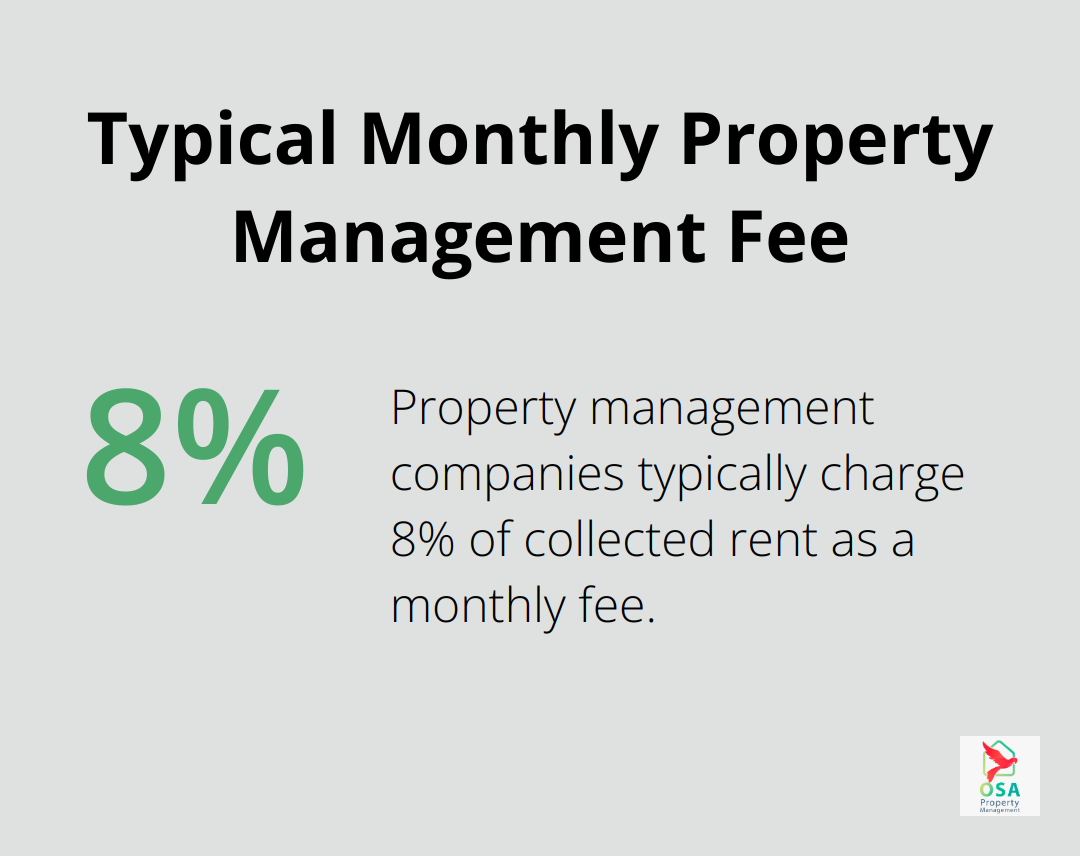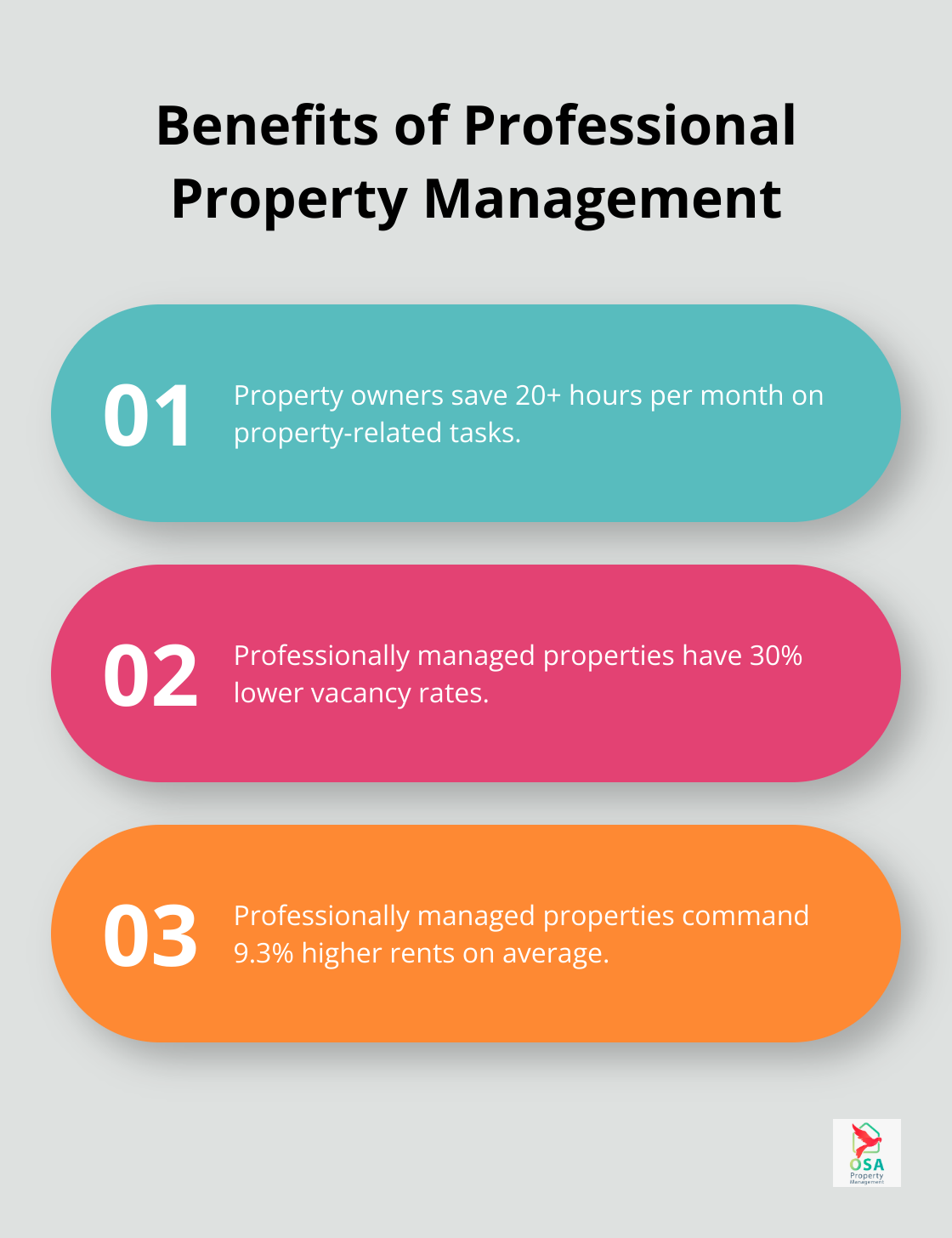At Osa Property Management, we often hear the question: “How much does property management charge?” It’s a crucial consideration for property owners looking to maximize their investments.
This comprehensive guide breaks down the various fees associated with professional property management, helping you understand the costs involved and make informed decisions.
What Do Property Management Fees Cover?
Monthly Management Fees
Property management companies typically charge a monthly fee of 8% of the collected rent. For a property renting at $1,200 per month, this translates to $96 in management fees. These fees cover essential services such as rent collection, tenant communication, and coordination of routine maintenance.

Leasing and Tenant Placement Fees
When a property requires a new tenant, most management companies charge a one-time leasing fee. This fee usually amounts to 50% to 100% of one month’s rent. It includes costs for marketing the property, screening potential tenants, and managing the move-in process. Some companies also impose a lease renewal fee (typically around $200) when a current tenant extends their lease.
Maintenance and Repair Costs
Maintenance fees vary widely depending on the property’s needs. Many companies add a markup (usually around 10%) on contractor invoices to cover their time coordinating repairs. Some offer in-house maintenance services at competitive rates. Regular inspections (costing between $50 and $100 each) can help prevent costly repairs in the future.
Additional Service Fees
Property management companies often provide extra services for additional fees. These may include:
- Bill pay services ($50-$300 per month)
- Eviction handling (approximately $500 plus legal fees)
- Vacancy fees for unoccupied properties (often equivalent to the expected monthly rent)
Factors Influencing Total Costs
The total cost of property management depends on various factors, including:
- Property type (single-family homes, multi-unit buildings, etc.)
- Location (urban vs. rural, high-cost vs. low-cost areas)
- Level of service required (basic management vs. full-service packages)
While these fees may seem substantial, professional management often results in better tenant retention, fewer vacancies, and potentially higher rental income. When selecting a property management company, it’s important to look beyond the base fees and evaluate the full range of services offered. This comprehensive approach will help you determine the best value for your investment and set the stage for understanding how these costs compare to managing properties in-house.
Breaking Down Property Management Costs
Property management fees vary widely, but understanding the typical cost structure helps property owners make informed decisions. Let’s explore the common charges you might encounter.
Monthly Management Fees
The cornerstone of property management services is the monthly management fee. Property management companies typically charge a monthly fee of 8%–12% of the monthly rent. For a property that rents for $1,200 per month, you could expect to pay between $96 and $144 in monthly management fees. Some companies, especially in competitive markets, may offer different rates. However, it’s important to consider the services included at each price point.
Tenant Placement and Lease Renewal
Finding and retaining quality tenants is a critical aspect of property management. Tenant placement fees usually range from 50% to 100% of one month’s rent. This fee covers marketing the property, screening potential tenants, and handling the move-in process.
Lease renewal fees are less common but can be charged when renewing a lease with an existing tenant. These fees cover the administrative costs of updating lease agreements and negotiating terms with existing tenants.
Maintenance and Repairs
Maintenance costs can significantly impact your bottom line. Many property management companies charge a markup on contractor invoices. Some firms offer in-house maintenance services, which can be more cost-effective. Regular property inspections can help prevent costly repairs down the line.
Additional Services and Fees
Property management companies often offer extra services that come with additional fees. These may include:
- Eviction handling
- Bill pay services
- Vacancy fees
- Setup or onboarding fees
The Value Proposition
While costs are an important consideration, it’s equally important to assess the value provided. A slightly higher fee might translate to superior service, better tenant screening, and more efficient property maintenance. These factors can lead to increased property value and rental income over time.
For instance, a company charging a higher percentage but maintaining a higher occupancy rate may provide more value than one charging less with lower occupancy. Similarly, a management company with strong vendor relationships might save you money on repairs and maintenance in the long run.
As we move forward, it’s essential to compare these professional management costs with the expenses and effort involved in self-managing your property. The next section will explore the differences between in-house and professional property management, helping you make an informed decision for your investment.
DIY vs Professional Property Management: A Cost-Benefit Analysis
The Hidden Expenses of Self-Management
Property owners who choose to self-manage often underestimate the true costs involved. Property owners using professional management save 20+ hours per month on property-related tasks. This significant time investment can impact other professional and personal commitments.
Self-management also carries the risk of costly mistakes. Improper tenant screening, for example, can lead to problematic renters and potential property damage. The National Apartment Association states that eviction costs range from $3,500 to $10,000 (a substantial expense that professional management companies are better equipped to avoid).

Financial Advantages of Professional Management
Professional property management services come with fees, but they often result in better financial outcomes. Landlords managing 10+ properties using a PMS report a 40% reduction in administrative workload compared to those managing manually. This reduction in administrative tasks can offset a significant portion of management fees.
Professional management companies typically have established relationships with vendors, often securing discounted rates for repairs and maintenance. These savings accumulate over time, contributing to a healthier bottom line for property owners.
Optimizing Rental Income
One of the most significant advantages of professional property management is the potential for increased rental income. Property management companies possess in-depth knowledge of local markets and can optimize rental pricing. A study in the Journal of Property Management found that professionally managed properties command rents that are, on average, 9.3% higher than those managed by individual landlords.
Professional management can also lead to shorter vacancy periods. The same study revealed that properties under professional management had vacancy rates 30% lower than self-managed properties. This increased occupancy translates directly to higher annual rental income.
Time and Stress Considerations
Self-management requires a significant time commitment and can be stressful, especially for those with full-time jobs or multiple properties. Professional management companies handle tenant communications, maintenance coordination, and legal compliance, freeing up property owners’ time and reducing stress.
Expertise and Legal Compliance
Professional property managers stay updated on local, state, and federal regulations affecting rental properties. This expertise helps avoid costly legal issues and ensures compliance with fair housing laws, lease agreements, and other relevant regulations.

Final Thoughts
Property management costs vary widely, but understanding the typical fee structure is important for property owners. Monthly management fees generally range from 8% to 12% of collected rent, with additional charges for tenant placement, lease renewals, and maintenance coordination. These fees often lead to better financial outcomes and reduced stress for property owners.
When considering how much property management companies charge, it’s essential to look beyond the price tag and focus on the value provided. A slightly higher fee might translate to superior service, better tenant screening, and more efficient property maintenance (which can lead to increased property value and rental income over time). Choosing the right property management company involves careful consideration of their experience, services offered, and track record.
Osa Property Management offers customized service packages tailored to your specific needs. Our approach covers marketing, tenant relations, bill payment, and tax compliance, providing peace of mind for homeowners. The decision to hire a property management company should be based on a thorough cost-benefit analysis, as professional management often proves to be a wise investment.

